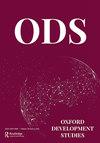概念厚理论薄:基于部门的反腐败战略案例
IF 1.2
Q3 DEVELOPMENT STUDIES
引用次数: 1
摘要
在过去的三十年中,随着发展中国家反腐败机构的激增,反腐败行业得到了惊人的发展。然而,成功的故事有限,因为尽管建立了这些专门机构,腐败仍然普遍存在。这篇文章主要讨论了非洲背景下腐败理论和反腐败策略之间的不匹配。我们认为,反腐失败的根源在于理论的不足,没有为反腐败提供足够强大的智力资源。利用定性专题分析技术,我们对选定的非洲国家的反腐败战略进行了广泛审查,并剖析了12个部门的部门案例研究。在此基础上,本文认为,部门划分的反腐败战略将是一个更好的反腐败目标。我们认为,基于部门的反腐败战略将更好地反映腐败现实,并通过弥合理论与现实之间的差距,帮助减少围绕腐败的概念歧义。本文章由计算机程序翻译,如有差异,请以英文原文为准。
Thick concept but thin theories: a case for sector-based anti-corruption strategy
ABSTRACT The anti-corruption industry has grown phenomenally in the last three decades with the proliferation of anti-corruption agencies in developing countries. However, there are limited success stories because corruption remains pervasive despite the establishment of these specialised agencies. This article thematically discuss the mismatch between corruption theories and anti-corruption strategies within an African context. We argue that the failing of anti-corruption efforts is rooted in a theoretical insufficiency which does not provide strong enough intellectual resources to battle corruption. Using qualitative thematic analysis techniques, we carried out an extensive review of anticorruption strategies across selected African countries and also dissected sectoral case studies across 12 sectors. Building on this, the article argues that sectorally demarcated anti-corruption strategies would be a better target for anti-corruption. We argue that sector-based anti-corruption strategies would provide a better reflection of corruption realities and help to reduce the conceptual ambiguities around corruption by bridging its theories and reality gap.
求助全文
通过发布文献求助,成功后即可免费获取论文全文。
去求助
来源期刊

Oxford Development Studies
DEVELOPMENT STUDIES-
CiteScore
2.70
自引率
0.00%
发文量
20
期刊介绍:
Oxford Development Studies is a multidisciplinary academic journal aimed at the student, research and policy-making community, which provides a forum for rigorous and critical analysis of conventional theories and policy issues in all aspects of development, and aims to contribute to new approaches. It covers a number of disciplines related to development, including economics, history, politics, anthropology and sociology, and will publish quantitative papers as well as surveys of literature.
 求助内容:
求助内容: 应助结果提醒方式:
应助结果提醒方式:


